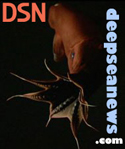Oekologie XV: Reflections at the Capital
Freshly returned from a trip to Washington D.C. with my family (in case you were wondering why blogging has been nonexistent), here is the 15th edition of the blog carnival on ecology and the environment!
The capital is an amazing place. It was my first time there and I was duly impressed by the monuments, museums and old architecture. 'Old' being a relative term for this young country, but I am used to the newer, more suburban look of the midwest and west coast. Being in the capital gave me a sense of excitement that I hadn't felt elsewhere. This is where big decisions are made, for better or worse, and great thinkers are working to solve important problems in our country and the rest of the world.
There is no shortage of environmental problems. For instance, Tim Abbott describes a new fungal outbreak that threatens populations of bats in the northeastern U.S. Jennifer talks about new research that claims manmade Lake Mead, on the Nevada-Arizona border, will go dry due to the effects of climate change. GrrlScientist discusses some negative consequences of deep-sea bottom trawling and causes of oceanic dead zones off the coast of Oregon. Phil for Humanity suggests that the answer may lie in "terraforming the Earth", or making the earth more habitable to life as it once was. Greg Laden suggests that very large parks will be the wave of the future. Are these the answer? Do they address the issues at hand or are they counter-productive?

But the history of natural history is young in this time. During Darwin's time, while he was picking the heads off bugs and contemplating the ecology of insects, as explained by Greg Laden, the United States was still struggling to set up a capital and unite the former colonies under a common set of laws. The 1830s saw the money by one mysterious englishman, James Smithson, for the founding of an "institution for the diffusion of knowledge among men" in the U.S. The politicians argued for some time about how to use this new found wealth ($500,000 - a fortune at that time for the juvenile U.S.). In fact, one Arkansas senator had embezzled the funds for use in his state for several years. Thanks to the efforts of John Quincy Adams, the funds were restored, but still arguments remained about what sort of "diffusion of knowledge" benefited the american people. Certainly basic science and natural history were not a priority as all current research was done with a strictly utilitarian purpose. Wildlife and their habitat was destroyed to make way for growth. The wolves were hunted nearly to extinction out of fear and for protection of livestock. As Jean Mosher relays to us, it is only very recently the gray wolf was delisted from the United States' endangered species list. Lets hope this is not premature.
 In other ecological news, Matt Mendenhall describes the palaeoecology of the forgotten, flightless seaduck of California (see image on left, source: Wikimedia commons). Ed Yong translates some new research on the trophic effects of introduced rats on islands. Controlling invasives is never an easy task, there are many confounding factors. John Beetham reports on the potential for the univoltine root mining weevils to control the invasive pervasive garlic mustard. Lets hope the biocontrol agent does not itself become a pest to other native plants.Finally, its the Year of the Frog! Jennifer tells us about FrogWatch. Spring is coming upon us in the north and I am anxious to take my son out and go frog hunting!
In other ecological news, Matt Mendenhall describes the palaeoecology of the forgotten, flightless seaduck of California (see image on left, source: Wikimedia commons). Ed Yong translates some new research on the trophic effects of introduced rats on islands. Controlling invasives is never an easy task, there are many confounding factors. John Beetham reports on the potential for the univoltine root mining weevils to control the invasive pervasive garlic mustard. Lets hope the biocontrol agent does not itself become a pest to other native plants.Finally, its the Year of the Frog! Jennifer tells us about FrogWatch. Spring is coming upon us in the north and I am anxious to take my son out and go frog hunting!Thats it for this carnival. Stay tuned to Oekologie for information about future editions and sign up to host an edition yourself! Edition XVI will be hosted at the Evangelical Ecologist.





















I just stubbled across your blog. I am an undergraduate the GWU in DC. To be honest, what first caught my eye was the picture with George Mason... it is traditional for students to have a bit to drink and go for a "monument walk." George and I had an encounter once, that is all I can say. Aside from that, your blog is wonderful and I am now subscribed and look forward to reading it daily.
ReplyDelete